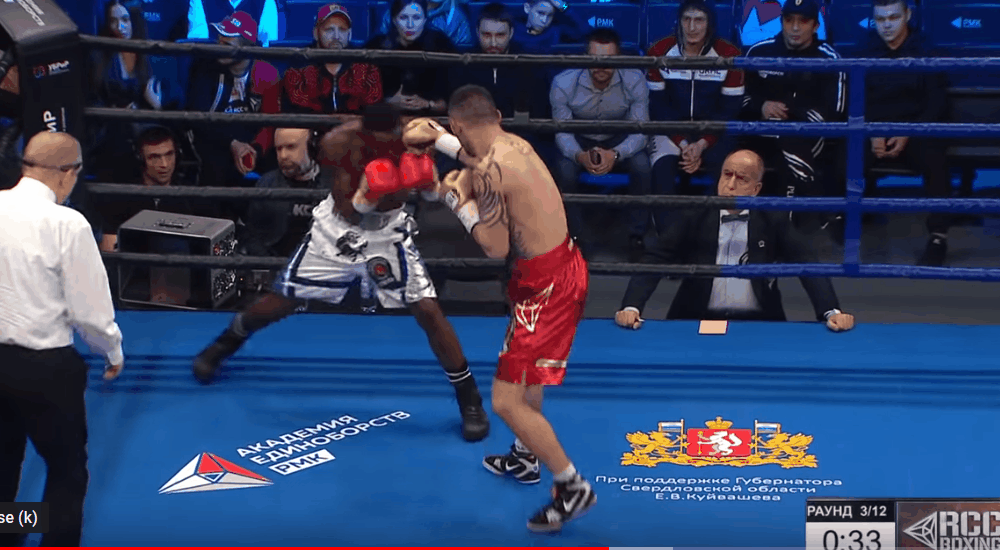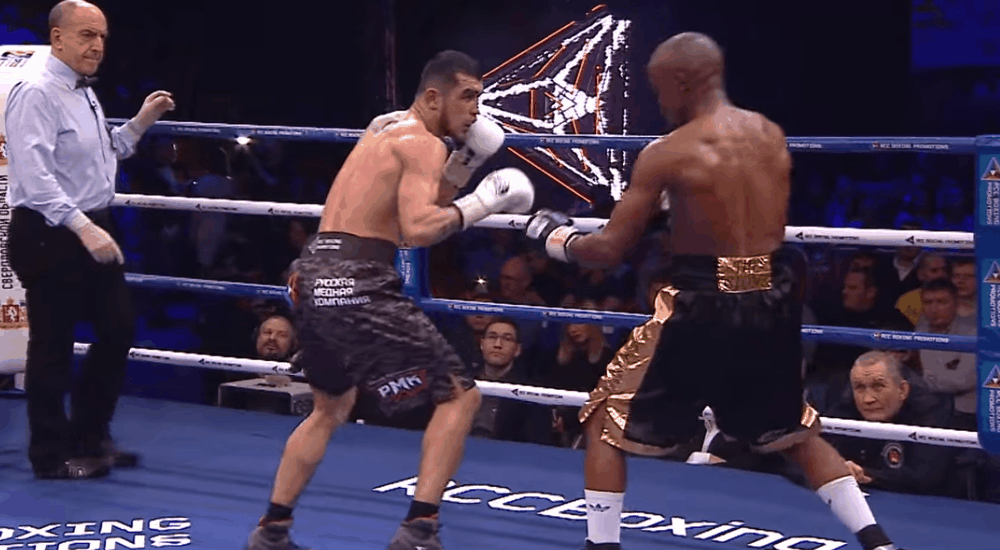Kings of the Future: Shavkatdzhon Rakhimov
Shavkatdzhon Rakhimov isn't a name familiar to an awful lot of Western boxing fans. Originally from Tajikistan, Rakhimov had a solid, if unspectacular amateur career. He now boxes out of Russia, and all but one of his fifteen pro fights have taken place there; the exception being his most recent win when he travelled to South Africa to face Azinga Fuzile in an IBF final eliminator. He hasn't been on our screens, so to those of us not in Russia, he hasn't generated the hype some other fighters in similar positions have.
However, he should be fighting Joseph Diaz for that title (Diaz's rematch clause with Farmer pending, but the IBF are not forgiving of rematch clauses) as soon as boxing is back on track, so let's take a look at a few of the things this crafty, aggressive southpaw does well, and some of the things he'll need to keep improving, as he prepares for his first world title challenge.
A good move is half the job…
The first thing you notice about Rakhimov, after maybe his tattoos, will undoubtedly be his footwork. It's not just that it is excellent, but it is the kind of flashy-slick, close-quarters, excellent-circling kind that hype trains are built on. He is very, very good at turning his opponents, and has a sharp change of direction that has left nearly all of them to date turning to follow one move while he goes the other way so quickly that he ends up standing behind them. This needs a little refinement in how he takes advantage of it, but the point is, there are very few fighters who manage to not stay directly in front of you even when they are directly in front of you quite as well as Rakhimov - he is very rarely in an even exchange, positionally speaking.
Here, Rakhimov shows his ability to switch sides very quickly to cause Azinga Fuzile a few problems
And here, poor Malcolm Klassen doesn’t know which way to turn.
Notice the varied approaches too - when Klassen is static, Rakhimov is able to create different angles simply by pivoting around his lead foot. Conversely, Fuzile’s wider stance and greater mobility require a different approach to angular movement, so Rakhimov uses short back-and-forth steps, at one point even shifting his stance to shorten the path for his left hand.
Simple, but layered
The second basic building block of his game is a lot less flashy: his jab. It is very busy and varied, both in its type and its application to head and body. Rakhimov’s jab combines well with his other punches. Being a southpaw undoubtedly helps the Tajikistani too, and he has shown an ability to use it both offensively and defensively (which comes in handy since not every part of his defensive game is flawless, as we will see later).
Rakhimov combines these two elements to great effect in the way he builds his attacks, together with an admirable attitude towards throwaway punches and feints, making him a difficult man to predict and evade.
You can see a simple, clear example of this in his first knockdown of Ronbison Castellanos. Having taught Castellanos very quickly that his jab is not to be ignored, he fakes one that Castellanos bites on. Then, he throws away a left that he also has no intention of landing but steps in with to land another right from a much shorter range that knocks Castellanos off-balance. Finished off with an awkward body shot, Rakhimov causes his man to go down. It is not a particularly clean sequence of events, but it is a perfect example of how, if you can make your opponent look the other way, you don't need to hit him clean to have an effect.
Here, Rakhimov puts all this together against Rohfiwa Maemu. Having maneuvered Maemu into a corner, he baits a reaction with a soft double jab, counters the counter, and throws a quick 1-2. Then, as Maemu tries to pivot and slide along the ropes, Rakhimov is able to stay with him, sticking a non-dangerous (but annoying) right hand to Maemu's gloves to limit his movement and draw his guard up. As Maemu tries to change direction, Rakhimov tags him to the body while still on the move.
Patience is a virtue
The final strength that should keep Rakhimov in good stead as he moves up the ranks is his ability to play the long game. This one is a bit harder to pin down in single snapshots, especially against opponents that he has mostly outclassed thus far, but it is something that showed itself strongly in his IBF eliminator against Azinga Fuzile. Rakhimov lost a significant portion of that fight before finding a comeback KO. At an initial glance, it might seem like a turnaround off of a fluke shot, but it was actually something the young fighter had been diligently building towards for the duration of the bout. After an even first three rounds, Fuzile began making Rakhimov miss with almost everything from the fourth round onwards. Fuzile utilized his speed and length advantages to hit Rakhimov (mostly with single or doubled-up shots, since he wasn't interested in prolonged exchanges) as the Tajikistani chased.
Rakhimov backs Fuzile towards a corner, but Fuzile is able to hit him twice with no pressure and spin away easily into clear space with an inside-angle pivot.
Rakhimov's strategy therefore relied on forcing those close-range exchanges. As the rounds progressed, he slowly adjusted and closed off every legitimate escape route by adjusting his footwork and throwing those layered attacks to corral Fuzile, even if many of his shots were still missing. By the seventh, Fuzile only had three responses – duck his head below waist level, causing the referee to warn him, turn his back completely (likewise), or exchange with Rakhimov to give himself the space he needed to escape.
In a similar situation a few rounds later, Fuzile finds himself with much less space. When he tries to spin out, Rakhimov sticks with him and chases him along the ropes. Fuzile’s attempts to slip under shots led to Rakhimov controlling his head, and he ultimately has no choice but to push Rakhimov to the ropes and grab hold.
Even forcing exchanges caused problems for Rakhimov. Towards the end of the seventh round, a cornered Fuzile hit him with a shot to the body that caused him to freeze and led to him taking heavy fire. He was forced into damage-limitation mode for the remainder of the round, and even into the eighth, he needed to take big shots to give them.
This paid off in a big way, however, two minutes into the round. When Rakhimov cornered Fuzile again, Fuzile was in a hurry to back Rakhimov up once more and promptly forgot his defence. A hard counter left hand over his jab dropped him. Although he stood up, he never recovered from the knockdown and lost the fight by stoppage with only a minute left to survive.
Previously, Rakhimov backed away from Fuzile’s jab, but this time, he simply follows it in, causing a change of distance Fuzile isn’t ready for.
Obviously, this was not a worry-free performance from Rakhimov, to the point that even with those advantages, he shouldn't necessarily be the favourite if the two men rematched tomorrow. For all his strengths, he clearly has a few limitations. The questions to ask are, why did he struggle with Fuzile and what in general are the areas he could stand to improve?
Limiting your own options
One answer is that, for all his creativity in setting them up, his actual arsenal of power punches is remarkably small and his selection sometimes lacking. In particular, he's very dedicated to very short, looped punches, preferably with his left hand (he loves a shovel hook to the body). He favors these options so much so that it can leave him falling short when he should be in range, or giving up openings to land straight shots, looking for hooks that aren’t necessarily there.
Fuzile isn’t an easy man to pin down in any case, but Rakhimov certainly made his job easier in the early running by insisting on throwing short, giving himself a much narrower punching range than his opponent.
Here is a very odd sequence against Klassen: Rakhimov maneuvers his opponent to a good position along the ropes, and then throws a series consisting almost entirely left hooks to the head, long past the point when Klassen had realised this. Klassen made a simple concession of raising his left hand, and strangely, Rakhimov ignored the huge openings this gave him to land almost anything else.
This is improving (he'd have been in real trouble against Fuzile if he didn't have a some decent longer shots to get his attention and cut off space with), but it is an area that needs significant work from him, especially if he ever plans to move up in weight.
…But not the whole job
The second main problem Rakhimov has is that, if he can be forced onto the backfoot, he doesn't always have a lot of an answer, which showed at points against Klassen, but even more clearly in his earlier fight against Emanuel Lopez. The movement is fine, of course; he circles well and will still be tough to trap in corners, although he can be caught as he turns out. However, if the opponent can keep moving forward, Rakhimov's volume drops considerably and he doesn't have any real ideas on how to counter or walk them into a trap. He is made to rely purely on his jab and setting his feet occasionally, hoping that this exchange will force them to back off and allow him to get his game going again.
There was an indication against Maemu that he has been working on this problem, (dropping his opponent several times with body shots as Maemu advanced) but Maemu had been attacking so recklessly that he hit Rakhimov multiple times with the exact same left hook. Taking advantage of that generous opening is not necessarily a sign that young fighter can exploit similar tendencies against more prepared, poised opponents.
He will likely still win a lot of fights on his jab alone, but it is a big signal to future world-class opponents that pushing him back is a very obvious strategic option to take most of his tools away, and Rakhimov will need to learn to consistently punish his opponents for missing.
Here is a scenario that played out a few times in Rakhimov vs Lopez. Having backed Rakhimov up with an initial shot, Lopez starts chasing and Rakhimov does little more than escape until he finds enough space to set his feet and reset at distance.
Concentration is a virtue too
I mentioned above that Rakhimov’s jab is excellent defensively, and his footwork makes him difficult to pin down as well, but when he does get into exchanges, his defensive responses are a mixed bag. The fundamental ideas are in place. He knows how to move his head both proactively and in reaction to what is coming at him, and he has a decent active guard much of the time. The problem is that, too often, he'll simply stop using them and get caught for no good reason. Rakhimov will find himself caught with his hands away from his body or by a simple shot to the head when he seemingly just forgets he should be moving it.
Despite his left hand in theory being at home and guarding his body, he lets his elbow drift out enough that Fuzile has no trouble making him jump with a quick right hand.
This is a simple example of Rakhimov getting his guard all wrong, not moving his head, and getting caught with a very telegraphed right hand from Lopez.
Temper, temper
Here is another curious contradiction about Rakhimov: even as he is setting up attacks, keeping a cool head, and narrowing his opponents options, he simultaneously seems perpetually on the verge of losing his temper. This manifested itself most clearly against Fuzile, particularly when Rakhimov responded to what he saw as provocation with two blatant fouls (one headbutt, one hitting from behind) that could easily have cost him a point from some referees. On a smaller scale, there are more frequent moments when Rakhimov will overreach trying to land, if the shot in a given combination that he didn't intend as a throwaway turns out to have been read and avoided, taking himself off balance. You can imagine this combines badly with the tendency for all his shots to be short-armed anyway.
Rakhimov attempts to bait Klassen with a fakeout jab then land a straight left, but rather than curtail it having seen Klassen anticipate it and slide back, he tries to get the punch home anyway and overreaches badly with his rear foot completely off the ground.
Rakhimov will also push and shove a lot with no real tactical purpose, if he feels he’s being clowned (Fuzile again) or outworked (Lopez, and certain occasions against Klassen). It is becoming less frequent as he matures (and sometimes even comes in handy, as the threat of being shoved about gives opponents extra things to think about), but it is something he will need to bear in mind, since higher level opponents will need less invitation to punish a lapse and not all referees will let him get away with it.
The Future
All in all, Rakhimov is an interesting fighter to watch and one with an unusually extreme variation between his strengths and his weaknesses. In my view, the young fighter’s trajectory definitely leans upward, and with consistent improvement, those weaknesses should get continue to minimize over time. As I previously mentioned, he is currently in a mandatory position for a shot for the IBF super-featherweight world title. This should be against Joseph Diaz, who won the title from Tevin Farmer in March, but a rematch clause on Farmer’s side and the IBF’s strict enforcement of on-time mandatory defences could throw a wrench into these plans. Should Farmer win, or should the title become vacant, Rakhimov may well face Fuzile again. The IBF have decided that a substance Rakhimov’s team held under his nose before the eighth round was adrenaline, as they claim, and not smelling salts, but also concluded that Fuzile has enough reason to be aggrieved to go straight back into a final eliminator for the same belt.
Whatever the future holds for him, though, Rakhimov should be a tough test for anyone in the 130lb division and his flashy, mobile style will be a treat for fans to watch, whatever happens.










